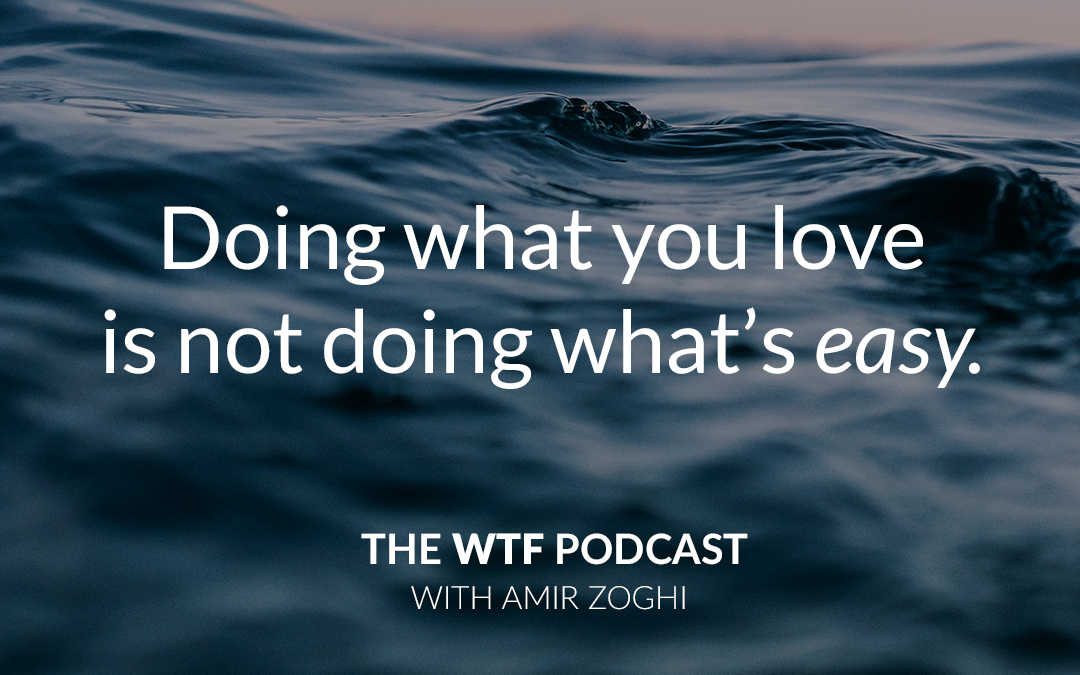You hear the importance of “doing what you love” from many different teachers and people in society. Almost everyone would agree that doing what you love would lead to a happier, more fulfilling life. But why is it so difficult to do? Why don’t more people do it? In this episode, I share the biggest misinterpretation around “doing what you love” and why most people don’t succeed in trying to do more of what they think they love in their life.

Or listen on Apple Podcasts App or Spotify
:::::::::::::::::::::::::::::::
Episode Transcript:
Welcome everyone. Welcome to my podcast. This is one of my favorite, uh, part of the podcast, these series that I’m currently doing, which is the Misinterpretations of Spirituality. And the reason that’s my favorite is because there’s so much that can be misinterpreted along this path. And, today in this episode, what I want to talk to you about is the misinterpretation about doing what you love.
—Hi, this is Amir Zoghi, speaker, coach and aerobatic pilot. I’m on a mission to inspire, move and transform people’s lives. This is the Wisdom, Truth and Freedom Podcast where I share mind-blowing insights about spirituality, self-actualization, and transcending those limiting mindsets in order to live in an unlimited lifestyle and to make it dent in the universe.—
I’ve been speaking for, well, you know, well, well within 15 years now. And uh, one of the main core topics of what I share with people is about doing what you love. I mean, you can’t argue that. You know, when I talk about this on stage about the, you know, the, the power, you know, our greatest power is love. You know, if you were to do what you love than I guess that’s gonna really, you know, change your life. It’s gonna really, uh, change your experience of your life. And, uh, you know, so when you hear this message about doing what you love to do and it not just from me but from many speakers, from many teachers, from many different philosophers, you know, you gotta be stupid to argue with that. Like, how can you argue with doing what you love to do it?
Yet, why is it so difficult for people to do what they love to do? And this is what I want to talk to you about, the misinterpretation of doing what you love to do. When I, when I’m speaking on stage or I’m coaching someone and I’m telling them, you know, you know, it’s about doing what you love to do. And like I said, most people would agree with that and go, yes, well, it just makes sense. You know, you’ve gotta do what you love to do. So then when I say, what is it that you love to do? A common answer that I can get is something along the lines of this, you know, “I just want to be sitting on the beach somewhere and just do nothing”, you know, or you know, “I just want to be doing whatever I want to do whenever I want to do”, you know, I just want to be in control of all that.
And already it’s been misinterpreted because doing what you love to does not mean doing what’s easy to do. And I’ll tell you why. Most people will say, or will look for the easy thing to do because they’ve been struggling. They’ve been living a difficult life, right? And when I say difficult life and you might be living a comfortable life, but the difficulty is doing something that you don’t enjoy doing, so you might be getting results and creating a beautiful, beautiful life, a beautiful cushion, let’s call it, not a beautiful life. You’ve got a cushion in your life. And then you’ve got people who don’t even have that cushion, right? When the question is posed to you, what is it that you love to do? You just go, you know, I just want to sit on the beach and do nothing. It’s because you’ve been doing what you need to do for such a long time that when the question comes to you, what do you love to do?
It’s the, you’ve had it up to your neck. You’ve had it up to your neck, of doing what you need to do. So it’s almost like, you know what, I just need to stop and do nothing. So the answer comes that, Hey, you know what? I just want to sit on a beach and and do absolutely nothing. Or I want to, I want to do whatever I want to do, whatever I want to do. You know, that that kind of answer. And this is the thing, what you truly love to do, it doesn’t align with an answer like that. Okay? It’s, it’s what what you love to do is not what’s easy to do. And that is this topic for this podcast, this is the misinterpretation of spirituality or mindfulness. When people hear that, you know, you should do what you love to do… the mind perceives or conceives that as well,
do what I love to do. You’re not hearing that. Do what you love to do. You’re going “do what is going to make me rich”, “do what’s easy”. The question is not what do you want to do to make yourself rich. What do you want to do to put yourself on a beach and do nothing? The question is what do you love? You’ve got to really stop and listen. And don’t let your mind kick in to find the answer that you perceive is the immediate answer, which is what is it that I want to do that’s going to create me to be sitting on a beach and do nothing? So that’s the first thing that I wanted to talk about in the misinterpretations of doing what you love to do. So doing what you love to do is not easy.
When you are looking to do what you love to do, does not mean there’s not lots of work. You know, you hear the term, the statement people say, you know, if you do what you love to do, you never work a day in your life. Again, misinterpretation, right? Because when you are doing what you love to do, you love to put the work into that. It’s not that you won’t work a day in your life. When you’re doing what you love to do, it doesn’t mean that there’s no risks involved. It doesn’t mean that you’re not going to fail. Failure is a potential possibility and you think to yourself, well, why would I do what I love to do if I would fail? Nobody said, do what’s safe to do. It’s do what you love to do. Okay, then why would I do what I love?
Because you feel alive. It’s not about the outcome or the result. Although we continuously measure, you know, what we do by what outcome or result gets created. It’s that when you’re doing what you love to do, you are alive. And if you even think to yourself about this, you want that outcome or result so that you can feel alive. You want to be in that position to do whatever you want to do, whenever you want to do. Because that kind of makes you feel alive. You want to be able to sit on the beach and do nothing because you can finally be at peace and feel alive. You know, like the thing is, we are looking to do the things that we love to do so we can feel alive, but we are looking and measuring the aliveness that may come from us doing that in the outcome and results.
But when you truly do what you love to do, you feel alive in the person that you’re being when you’re doing that. So it’s not about the outcome and result. Although you know some wonderful outcomes and results may present themselves to you when you are doing what you love to do. Yes. That may be, but the thing is you’re not attached to that outcome or result and nor were you trying to or trying to manipulate that to take place because you feel alive when you’re doing what you love to do. What you will find when you are doing what you love to do, is that it becomes effortless. Yes. Like I said to you, it requires work, but the work that you’re doing is effortless. Okay, so let’s, let’s look at this because this is another misinterpretation because when people think effortless, they think to themselves, well it requires no effort from me. So the lazy mind goes, I love to do, what I love to do, because then I won’t have to put effort into. Incorrect, right? The part that you experience, the effortlessness, is not in what you do, it’s in who you’re being. It’s your soul. Your soul is soaring, your soul is free, when you are doing what you love to do. That is the effortlessness part. Don’t mistake that with, well, if I do what I love to do, then you know, then whatever effort I put in will be minimal because it’s effortless rather than effort-full. No, no. Your soul is experiencing the effortlessness, if that’s a word. Okay. When you’re doing something that you need to do, when you’re doing something because it’s totally, you know, outcome or result-driven, only…your soul experiences a heaviness. That’s called the effort-full experience.
So don’t mistaken this, this statement of being effortless, effortless or effortful as something that is, that is experienced through form, through the physical. No, through the physical, right….this is the thing. You wouldn’t enjoy it if it just, if you just clicked your finger and it happened, right? You just wouldn’t enjoy that. I mean, look at the, a mother who conceives a baby and carries this baby for nine months and then at the end of nine months they have to give birth to this baby. Like, the experience, the physical pain, the pushing that is required for this baby to come to this world, right? It’s not… The effortlessness is in their heart. Okay? Because they feel a bond and the connection with a being within them, they feel a love. The love is there. The effortlessness is experienced once the baby has come out and the connection is experienced with it, with that baby.
So don’t think to yourself that, Hey, doing what you love to do is what’s easy to do. That’s completely incorrect. And I continuously, wherever I speak, you know, if I ever say to someone, Hey, what is it that you love to do? You can just see their mind just back flipping and forward flipping. And there’s a monkey in their mind thinking to themselves, Oh, you know, I’ve had a hard life. I just want to do what’s easy to do. Don’t be of hard work when it is what you truly love to do. And when you’re experiencing the uphill battle, don’t then think to yourself, well, maybe this is not what I love to do. Now, I will pose the other side of the coin here where you will sometimes experience in life doing something and it is a continuous up hill battle continuously, but your soul is not feeling free in this, right?
You’re having the uphill battle like on the physical realm, in the story. There is this uphill battle, but your soul doesn’t feel light. That’s when you’re probably not doing what’s really, what you truly love to do. Okay, so in that time it’s probably wise to give up and start again. It’s wise to give up and go back to a blank canvas and go, what is it that I really love to do? Right? On the flip side of that coin, when you’re experiencing yourself having difficulties having the uphill battle…but your soul feels alive in that, keep going. Okay? It’s not meant to be just easy. The process here is what this idea of doing what you love to do is about. People think it’s about the outcome or the result. It’s within the process. It’s, the process is creating space.
It’s making you bigger. It’s making you into the bigger person, into the bigger mindset, in order for you to be able to live what it is that you love to do. So, to wrap this podcast up, remember that when you’re doing what you love to do, it doesn’t mean it’s easy. It doesn’t mean, and when you, when, yes, it means it’s effortless, but the effortless is not what most people think. The effortless-ness is about the internal process. Internally you feel alive. Let me give you an example. You know, something that you can relate to. You know, when you are experiencing yourself going to the gym, all right? If you love going to the gym, you know you’ve decided to do it and it’s something that you decided to do and therefore you’re doing it. When you do what you decided to do, and when you make a decision to do something, and when you do that and they’re aligned together, right? There is a, you know… You’re experiencing yourself on the treadmill. You’re experiencing yourself doing pushups, whatever it is in the gym, right? It’s difficult, but you feel good. You feel good about it when you’re doing it, you feel good about it after you’ve done it, right? There is a lightness in you. But there is a physical difficulty that takes place. That’s what I’m talking to you about. Again, on the flip side of the coin, if you’re trying to lift weights that you can’t even lift one rep from…yeah, you’re probably doing the wrong weights. Okay? You probably need to go back to the drawing board, back to the white canvas and go, Hey, why am I really here at the gym? Okay, so again, you notice the difference when you’re doing what you love to do.
Yes, there may be difficulty. Yes, there may be an uphill battle. But you feel alive. You feel, your soul feels light and that’s the effortless experience that I’m talking to you about. Don’t confuse the effortless experience as it being easy in the story. And just remember when you are looking for the easy, in the story, it’s just cause you’ve had a hard time. You’ve been doing what you need to do. You’ve been having the effort-full experience for such a long time. You just need a break. You want to sit on the beach. Okay? Anyone that I know personally that has got to a point of retirement has always find something new to get passionate about. Find something new to, to grow in and dedicate themselves in. Because if they don’t, they say within two or three or four years, people will leave this world. If you retire and do nothing. You’re not here to do nothing, right?
So that’s probably one of the most powerful misinterpretations that I wanna share with you today. That, and we’re going to continue with a whole bunch more about this series. And just remember, doing what you love to do is not necessarily easy. Does not mean you won’t fail. To you, It means, if you’re doing what you love to do it, it means that it’s worth failing for. Like you’re not, it’s not like you’re thinking to yourself, geez, you know what? If I fail…it’s like you’ve already failed. If you haven’t done it like, it’s worth putting yourself and dedicating yourself to this, for this thing, because it’s worth failing for. It’s a different mindset. Thanks for joining me on this podcast.
:::::::::::::::::::::::::::::::
What did you think of this episode? I’d love to hear your feedback in our Amir Zoghi Community on Facebook. Click here to join the free private group.

Ask Amir: Got a burning question you’d love to ask Amir about mindset, spirituality or your journey to self-actualization? Submit your question here and he may answer it on a future Ask Amir episode of The WTF Podcast.
